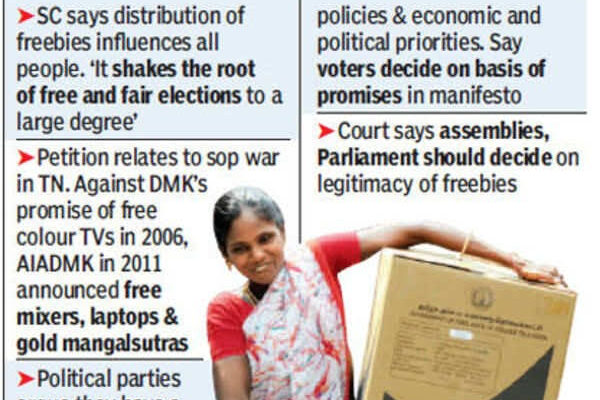From Our Bureau
NEW DELHI: The Supreme Court on Thursday ruled out deregistration of the political parties promising freebies to lure the voters in the elections as prayed by main petitioner Ashwini Kumar Upadhyay, a Delhi BJP lawyer, but used strong words that distribution of freebies by parties is a “serious issue” and this culture need to stop.
The hearing was adjourned to the next Wednesday to get the views of all sides on constitution of an expert panel to scrutinise the issues associated with irrational freebies which was also endorsed by Solicitor General Tushar Mehta on Thursday.
“I do not want to enter the area of deregistering political party (giving freebies) as it is an undemocratic area. We are a democracy after all, said Chief Justice of India N V Ramana.
Calling for a balance between the people’s welfare schemes and freebies, the 2-member Bench comprising CJI Ramana and Justice Krishna Murari, said the entire amount should be spent on developing the infrastructure. He said: “It is a serious issue. Those getting it want it and ours is a welfare state. Some may say they are paying taxes and it has to be used for development. So both sides have to be heard by the committee proposed to examine the issue.”
The AAP alleged that the petitioner, Ashwini Upadhyay, has strong links to the BJP and wants to oppose welfare schemes, which have radically transformed the lives of the weaker sections of society and have been callously labelled as “freebies”.
Arguing on behalf of AAP, senior advocate Abhishek Manu Singhvi said providing free education, drinking water and healthcare is the constitutional responsibility of the government, however waiving corporate loans is a freebie.
AAP, which has intervened in the PIL of Upadhyay, sought regulation of freebies while pointing out the difference between welfare schemes and freebies. The court sid the effect of them on the economy has to be assessed.
Its counsel Singhvi said: “We understand that your Lordships has raised a very important issue. The word freebie is being used in a very wrong manner.” The bench responded saying, “we are careful to what extent we can go.”
Singhvi asserted that the petioner’s prayer to prohibit the parties promise or make any claims about the manner in which they want to meet this mandate is not just untenable but also malafide. “By removing such socialist and welfare agenda from the electoral discourse, the petitioner seeks to advance the interests of a different, more parochial kind of politics reliant on caste and communal appeals instead of on appeals to the people’s welfare.”
AAP made out a case that “the petition, while referring vaguely to freebies, clearly seeks judicial action against a particular model of economic development by exclusively targeting fiscal expenditure on socialist and welfarist measures for the masses.”
Citing welfare schemes adopted by the developed countries, AAP said particularly in the Scandinavian nations, the socialist and welfarist model of development has allowed significant leap in the nations’ performance across several markers of progress, including but not restricted to the markers like Gini Coefficient which represents economic inequality and human development index which seeks out an overall assessment of social, educational and health indicators of quality of life.
The committee suggested by the Solicitor General Tushar is supposed to comprise a central government secretary, a state government secretary, representatives of political parties, Reserve Bank of India, Finance Commission, National Tax Payers Association and those who support the freebies. He said if freebies are considered to be welfare of the people, it will lead to disaster.
In an earlier hearing, the SC had acknowledged that some help to the poor is required.





